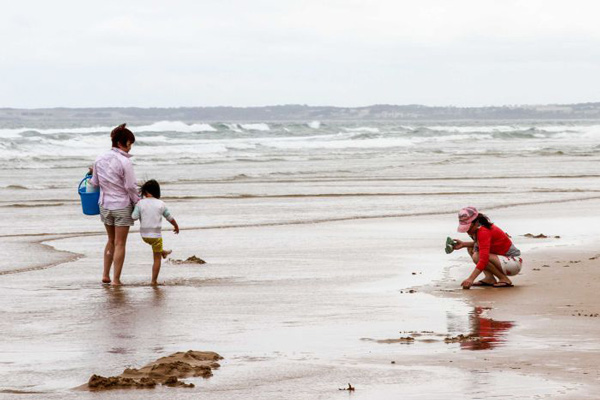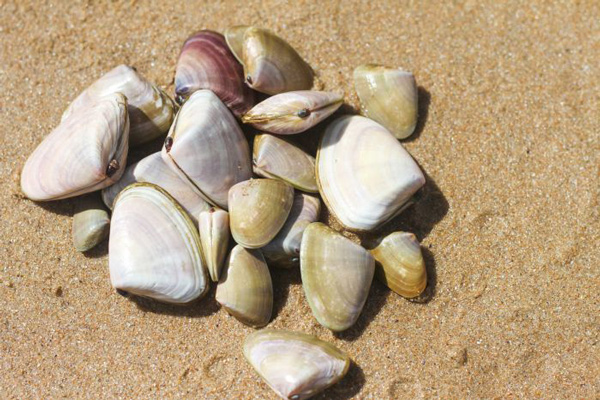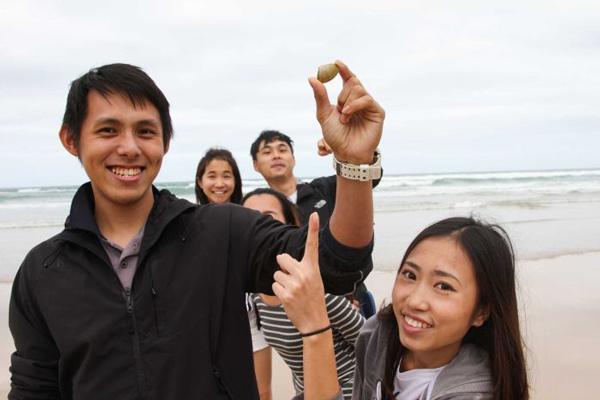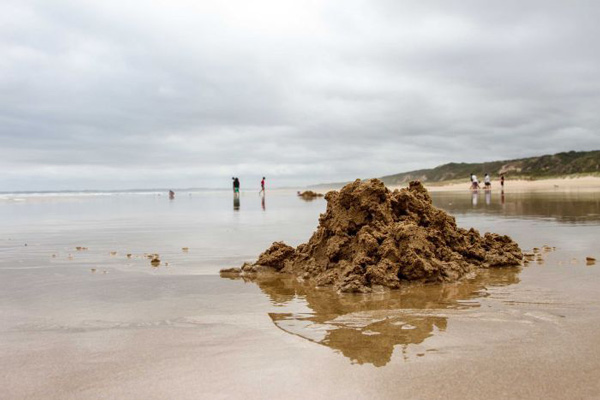当前位置: Language Tips> 双语新闻
Pipis: The unassuming shellfish at the heart of a racially fuelled debate at Venus Bay
据外媒报道,过去8年,澳大利亚维省海岸小镇金星湾(Venus Bay)成为挖蚬胜地,尤其在盛夏,逾2500名“一日游”游客自墨尔本涌入,绝大多数是中国人。这股挖蚬热潮引起当地居民强烈不满,更衍生割车胎、破坏财物等罪行。居民坚称没有种族歧视,而是担心游客造成的环境及社会问题。

Tyre slashing, vandalism and racially charged incidents are all part of the storm that has been brewing in the otherwise quaint Victorian coastal town of Venus Bay.
维多利亚省古朴的海岸小镇金星湾接连上演割车胎、破坏财物、种族歧视等事件,一场风暴正在酝酿。
And it all centres on the innocuous shellfish - the pipi.
而这场风暴的中心竟是无毒贝类生物——蚬。
At the height of summer, when the conditions are right, more than 2,500 predominately Chinese people can be found digging up the coastline of Venus Bay, 175 kilometres south-east of Melbourne, in search of pipis to eat.
金星湾位于墨尔本东南边175公里处,盛夏时节适宜挖蚬,到这时会有2500多人在金星湾海边挖蚬来当食材,其中主要是中国人。
It has prompted a fierce push back by locals, who insist their concerns about the daytrippers are not racist but are instead driven by environmental and social concerns.
此事引发了当地人强烈的不满,他们坚称对“一日游”游客的担忧并非源于种族歧视,而是顾忌因此造成的环境及社会问题。
Scientists and authorities are now conducting research aimed at eliminating the emotional elements of the debate in an attempt to quantify the ecological impact of pipi harvesting.
科学家和政府正在进行研究,试图量化挖蚬的生态影响,以消除这场争论中的情感因素。
A brief pipi history
金星湾的挖蚬史

Ever since the 1960s when the area around Venus Bay was first developed, the inconspicuous shellfish found under the sand at low tide has been harvested both commercially and recreationally for bait.
自20世纪60年代起,金星湾周边地区得到开发,退潮时挖蚬作鱼饵成了这里的一项商业及消遣活动。
But over the past eight years, the town, home to a mere 500 permanent residents, has become a hotspot for pipi harvesting among Melbourne's Chinese community.
金星湾常住居民只有500人,但过去8年,这里成为墨尔本华人的挖蚬胜地。
On a busy summer's day, thousands of pipi harvesters dig up the main beach in search of the shellfish.
到了热闹的夏季,一天就有数千人在金星湾最大的沙滩“一号滩”挖蚬。
Locals have become frustrated with the stress visiting pipi harvesters place on the town's amenities - the car parks, rubbish bins, public toilets - even claiming it restricts emergency service access to the beach.
前来挖蚬的游客给金星湾的停车场、垃圾桶、公共厕所等设施带来压力,这让当地居民感到困扰。当地人甚至声称,游客阻碍了应急服务进入沙滩。
Beyond the changing dynamic of the town though, there are concerns the rapid increase in pipi harvesting is seeing the species' populations being depleted beyond repair.
除了这些变化,还有人担心挖蚬数量迅速增长使得种群数量减少到无法恢复的程度。
John Morrongiello, a lecturer of marine biology at the University of Melbourne, is conducting a study into the impact of pipi harvesting at Venus Bay.
墨尔本大学海洋生物系讲师约翰•莫伦哲路正在研究挖蚬对金星湾的影响。
"At the moment there's a degree of he-said, she-said going on; what we really need is some hard facts and that is our role as scientists to do an objective research project."
她表示:“目前存在许多公众争论,我们真正需要的是确切证据,而科学家要做的就是进行客观研究。”
Authorities have responded to specific concerns of over-fishing.
政府已经就民众对过度捕捞的担忧做出了反应。
In Venus Bay, unlike the rest of Victoria, you can now only take two litres of pipis rather than five.
维多利亚的其他地方可以挖5升蚬,而在金星湾,你只能挖2升。
No tools like spades can be used, only hands and feet.
禁止使用铲子等工具,只能用手和脚。
Police and the Fisheries Department have also set up road blocks during the busy period to search cars.
警察和渔业部门在挖蚬高峰期还会设置路障,检查车辆。
A matter of perception
对华人的认同问题

Anthropologist Lisa Hatfield is a PhD candidate at Latrobe University in Melbourne who has spent the past three years investigating the social impacts of pipi harvesting at Venus Bay.
人类学家丽莎•哈特菲尔德正在拉筹伯大学的攻读博士,过去3年里,她一直在调查金星湾挖蚬潮的社会影响。
She was drawn to the dispute over the "unassuming little critter" because it raised wider questions about Australia's attitudes toward multiculturalism and identity.
她之所对这个“不起眼的小生物”引发的分歧很感兴趣,是因为由此引出了更多关于澳大利亚对多元文化和身份认同的态度的问题。
"The issues the locals had with the pipi harvesters were that they were coming for just one purpose; they were coming in organised groups to collect pipis in commercial quantities," she said.
她说:“挖蚬游客前来目的只有一个,他们组团来挖蚬,挖到的数量已具有商业价值。这让当地人很不满。”
"They said it was their culture to take everything.
“居民称,扫荡是他们的文化。”
"There were also complaints they weren't actually contributing to the local economy in any way."
“还有人抱怨挖蚬游客对本地经济根本没有任何贡献。”
After inspecting the beach herself, Ms Hatfield found these ideas were "often the exception rather than the rule".
经过亲身观察,哈特菲尔德发现这种观点“通常是个例而不是普遍情况”。
"Locals were drawing on longstanding ingrained stereotypes we have about Asian people in Australia," she said.
“当地人的看法源于澳大利亚人对亚洲人根深蒂固的印象。”
Despite this, Ms Hatfield said there were still valid concerns about the pipi harvesting at Venus Bay.
不过哈特菲尔德表示,当地人对金星湾挖蚬潮的忧虑也存在合理性。
"The locals felt they were being dismissed and being called racist, when in a way they are coming to grips with the changes that are going on at Venus Bay.
“他们在适应金星湾发生的变化时,感到被忽视并被指种族歧视。”
"They're concerned that they're losing their sense of place and their sense of belonging."
“他们担心失去存在感和归属感。”
Are pipi populations depleting?
蚬的数量大幅减少了吗?

Down at Beach One, Dr Morrongiello and his field assistants conduct monthly check-ups of the pipi population.
莫伦哲路博士和他的现场助理们每月都会对“一号滩”的蚬数量进行核算。
With just a year's worth of data, Dr Morrongiello said he was hesitant to jump to any conclusions about how the pipis were being impacted by harvesters.
由于只有一年的数据,莫伦哲路说,他还无法就挖蚬者对该生物产生的影响得出任何结论。
"Every time we harvest a population, we're impacting on the biology there, so yes we are having an impact on the pipis," he said.
“每当我们对一个物种进行捕捞,就会对当地的生态产生影响,所以对蚬有影响是肯定的。”
"What we don't know is how much of an impact that is."
“我们不清楚的是,这种影响有多大。”
What next for Venus Bay?
金星湾未来该怎么办
Ms Hatfield described Venus Bay's beach as a segregated space - locals in one area and "pipi hunters" in another.
哈特菲尔德将金星湾称成为一个被撕裂的地方,当地人在一边,“挖蚬者”在另一边。
She said creating more common space could be one solution.
她认为,创造更多的公共空间是一种解决方法。
"To have a space that's more welcoming and accepting of both beach users.
“创造一个对两方都更加欢迎和接纳的空间。”
"Finding that common ground is really important to the town moving on."
“找到这样一个共同空间对于金星湾的发展至关重要。”
英文来源:ABC
翻译&编辑:董静
审校:丹妮
上一篇 : 吃货必看:全球奇葩美食推荐
下一篇 : 看《人民的名义》学英语
关注和订阅

电话:8610-84883645
传真:8610-84883500
Email: languagetips@chinadaily.com.cn